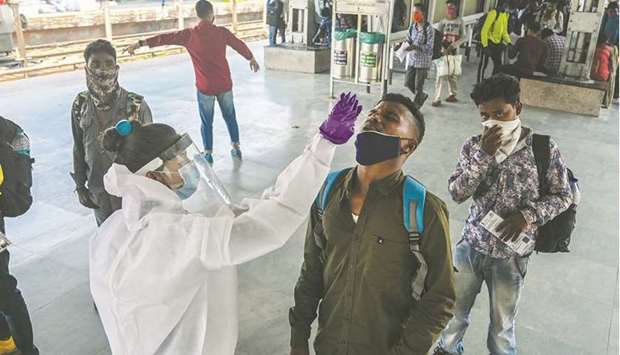Indian authorities clamped down on one of the country’s biggest Hindu festivals yesterday as the country passed 12mn coronavirus cases with financial hub Mumbai recording its highest-ever rise in daily infections.
Public celebrations to mark Holi — a popular festival where people smear colour on each other — were banned in some states and territories, including the capital Delhi, over fears they could become ‘super-spreader’ events, with police patrolling streets in Mumbai to prevent large gatherings.
Despite the restrictions, revellers still gathered in neighbourhoods across the country, banging drums and hurling coloured powder at each other. “We are aware of the pandemic, but we can not ignore the wishes of the people who want to celebrate the festival of colour,” TV actor Debdut Ghosh, who is campaigning for an election in West Bengal state, told AFP in Kolkata.
Many people also took to the streets in the northern city of Lucknow in Uttar Pradesh state, the country’s Hindu heartland of 1.3bn people.
“Had it not been a festival, I would not have stepped out,” septuagenarian B K Tiwari told AFP as he carried his colour-smeared facemask. The muted celebrations went ahead despite a nationwide surge in coronavirus cases.
India reported 68,020 new daily infections on Monday — a significant rise from below 9,000 in early February — taking the total number of cases to more than 12mn. “If the outbreak grows at that pace — about five times in five weeks — that’s worrisome,” virologist Shahid Jameel told AFP, adding that the lack of mask-wearing and social distancing was fuelling the surge. Mumbai reported more than 6,900 new cases — a record for the city of 20mn and more than double last year’s peak.
The western state of Maharashtra, home to Mumbai, is mulling a full lockdown to tackle the spread of the disease after imposing a nightly curfew from Sunday.
India — the third-most infected nation — has shied away from harsh restrictions to combat Covid-19, after gradually lifting one of the world’s strictest lockdowns last year to revive the devastated economy.
Optimism that India’s vaccine drive would ease the impact of the virus has also faltered with sluggish inoculation rates.
More than 60mn shots have been administered since mid-January, a far slower pace than needed to reach the ambitious target of vaccinating 300 million people by the end of July. India, home to the world’s biggest vaccine manufacturer, has meanwhile slowed its export of shots due to the spike.

A health worker takes a swab sample for a Rapid Antigen Testing (RAT) from passengers arriving into Mumbai city at a railway terminus as made mandatory by the state government due to a rise in Covid-19 cases.
